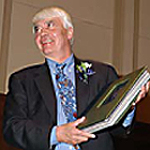Jill Beck makes her official public debut as Lawrence University’s 15th president Thursday, Sept. 23, opening the college’s 155th academic year with her first matriculation address.
Beck, who was named the successor of long-time Lawrence president Richard Warch in January and assumed the president’s duties in July, will deliver the address “The Value of Individualized Instruction in
Liberal Education” at 11:10 a.m. in the Lawrence Memorial Chapel. The event is free and open to the public.
Beck will discuss the importance of highly individualized, one-on-one personal interaction between students and teachers and why that kind of close collaboration is so essential to effective learning.
Prior to her appointment as president of Lawrence, Beck spent eight years as dean of the Claire Trevor School of the Arts at the University of California-Irvine. During her tenure as dean, she founded ArtsBridge America, a national model for the advancement of educational arts partnerships between universities and K-12 communities, and established the da Vinci Research Center for Learning Through the Arts, an interdisciplinary center for research focused on learning across disciplines.
A native of Worcester, Mass., Beck earned a bachelor of arts degree from Clark University in 1970 and her Ph.D. from City University of New York.
In addition to opening the new academic year, Beck’s matriculation address also launches Lawrence’s five-part convocation series for the 2004-05 academic year. Other scheduled speakers in the convocation series include:
Oct. 7 — Columnist, author and political commentator Arianna Huffington
Feb. 8 — Georgia Congressman and noted civil rights activist John Lewis
March 8 — Human rights activist and Partners in Health medical director Joia Mukherjee
May 26 — Columbia University President Lee Bollinger

